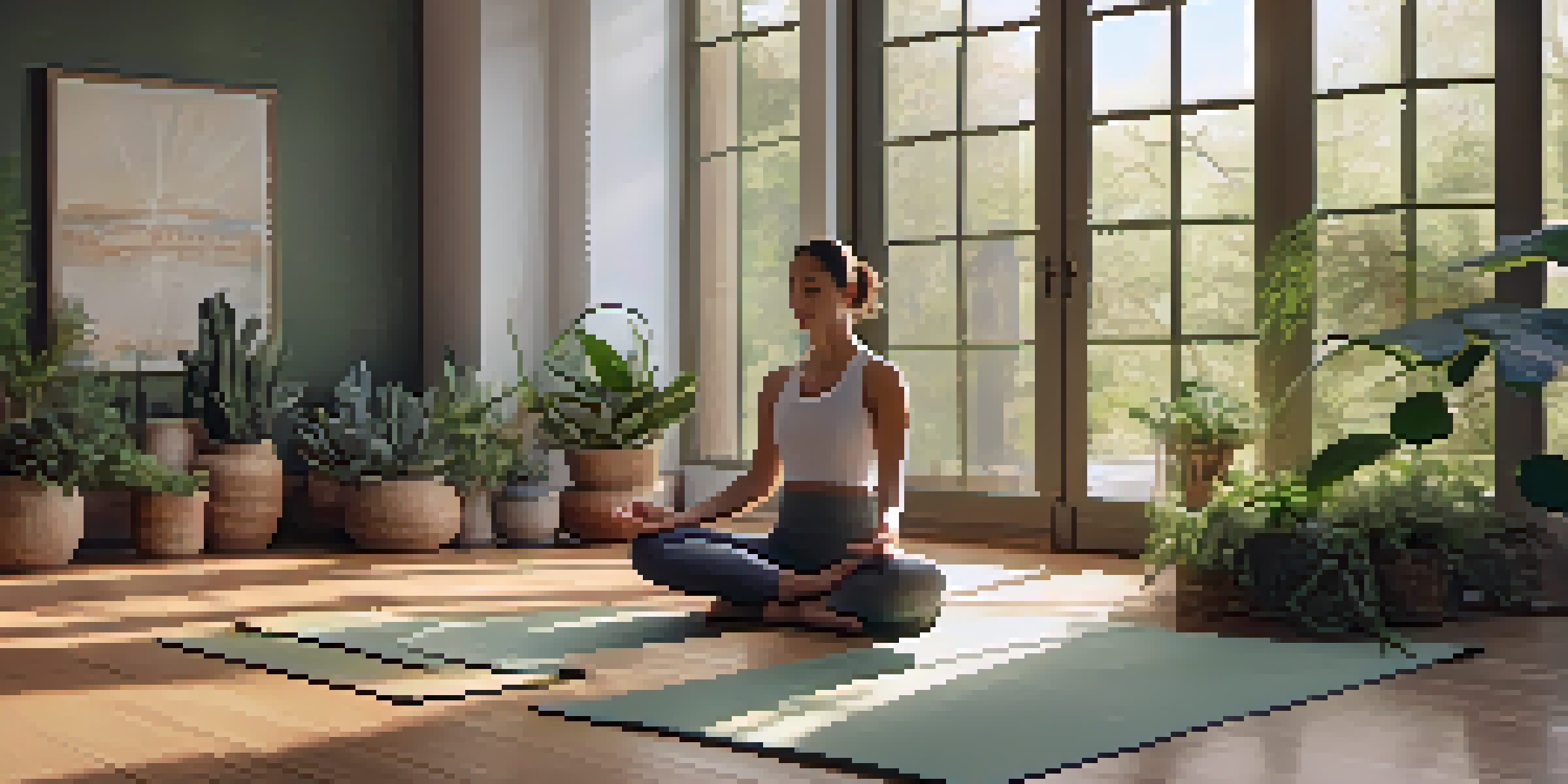The Role of Meditation in Enhancing Yoga Practice

Understanding the Connection Between Meditation and Yoga
Meditation and yoga are often intertwined, both aiming to cultivate mindfulness and inner peace. While yoga focuses on physical postures, meditation emphasizes mental stillness. Together, they create a harmonious blend of body and mind, enhancing overall wellness.
Meditation is not a means to an end. It is both the means and the end.
Think of yoga as a physical journey that prepares your body, while meditation is the mental journey that deepens your experience. When practiced together, they complement each other beautifully, promoting a holistic approach to health. This synergy can lead to profound insights and personal growth.
By understanding their connection, practitioners can better appreciate how each discipline supports the other. This sets the stage for a richer, more fulfilling yoga experience, as meditation enhances your awareness both on and off the mat.
The Benefits of Incorporating Meditation into Yoga
Incorporating meditation into your yoga routine can significantly improve your practice. It helps cultivate concentration, allowing you to focus more deeply on your poses and breathing. This enhanced focus leads to greater alignment and a deeper connection with your body.

Moreover, meditation can help reduce stress and anxiety, which often distract us during yoga. By calming the mind before or after practicing asanas, you create a sanctuary for personal reflection and relaxation. This can transform your yoga sessions from a mere workout into a nurturing experience.
Meditation Enhances Yoga Practice
Integrating meditation into yoga cultivates concentration, reduces stress, and fosters emotional resilience.
Additionally, the integration of meditation can enhance emotional resilience. It encourages you to observe your thoughts and feelings without judgment, fostering a healthier relationship with yourself. This emotional clarity can lead to more meaningful connections both on and off the mat.
Techniques for Integrating Meditation into Your Practice
There are several effective ways to incorporate meditation into your yoga practice. One simple technique is to begin or end your yoga session with a few minutes of seated meditation. This allows you to center your thoughts and intentions before moving into physical postures.
Yoga is the journey of the self, through the self, to the self.
Another approach is to focus on your breath during your asanas. By maintaining awareness of your breath, you engage in a form of moving meditation that enhances your practice. This mindfulness can bring a sense of tranquility to even the most challenging poses.
You might also consider guided meditations specifically designed for yogis. These can provide valuable insights and techniques that complement your physical practice. Over time, you'll notice how these meditative elements enrich your yoga journey.
Mindfulness: The Heart of Meditation and Yoga
At the core of both meditation and yoga lies mindfulness—the practice of being fully present in the moment. Mindfulness helps you become aware of your thoughts, feelings, and physical sensations without judgment. This heightened awareness can greatly enhance your yoga experience.
When you practice mindfulness on the mat, you’re better equipped to handle distractions. It allows you to navigate through challenging poses with grace and ease, fostering a deeper connection to your body and breath. This connection is vital for achieving balance and harmony in your practice.
Mindfulness is Key to Both
Practicing mindfulness enhances your awareness, helping you navigate challenges with greater ease and acceptance.
Ultimately, cultivating mindfulness through meditation can lead to greater self-acceptance and inner peace. As you become more aware of your body’s capabilities and limitations, you’ll find joy in the journey rather than just the destination.
Overcoming Challenges in Your Meditation and Yoga Journey
Many people face challenges when trying to integrate meditation into their yoga practice. Common obstacles include a wandering mind, restlessness, or difficulty finding time. Acknowledging these challenges is the first step toward overcoming them.
To combat a wandering mind, try focusing on a single point or your breath. This can help anchor your thoughts and keep you grounded during meditation. Additionally, setting aside a specific time each day for practice can help build consistency and make meditation feel more manageable.
Remember, it's perfectly normal to encounter challenges along the way. Embrace the process, and give yourself grace as you explore the synergy of meditation and yoga. Each practice session is an opportunity for growth and self-discovery.
Finding Your Personal Meditation Style in Yoga
Just as there are various styles of yoga, there are numerous meditation techniques to explore. From mindfulness meditation to loving-kindness and transcendental meditation, finding the right fit can enhance your yoga practice. Experimenting with different styles can be an enlightening journey.
You might find that certain meditation practices resonate with you more than others. For instance, if you enjoy movement, you may thrive with walking meditation, while others may prefer sitting in stillness. Listening to your intuition will guide you to the practices that best support your yoga journey.
Explore Your Personal Style
Finding the right meditation technique can enrich your yoga journey and deepen your connection to both practices.
As you explore these different styles, remember to remain patient with yourself. The goal is to find a practice that feels authentic and enriching, allowing you to deepen your connection to both meditation and yoga.
The Long-Term Impact of Meditation on Your Yoga Practice
The benefits of incorporating meditation into your yoga practice extend beyond the mat. Over time, meditation can lead to increased mindfulness in daily life, enhancing your overall well-being. This transformation often results in improved mental clarity, emotional stability, and a greater sense of purpose.
As you cultivate a regular meditation practice, you may find it easier to manage stress and anxiety in your everyday life. This resilience can carry over into your yoga sessions, making it easier to face challenges with a calm and composed mindset. The journey becomes one of growth, both personally and spiritually.

Ultimately, the long-term impact of meditation on your yoga practice can be profound. It fosters a deeper understanding of yourself, your body, and your mind, leading to a more fulfilling and enriched experience on your yoga journey.